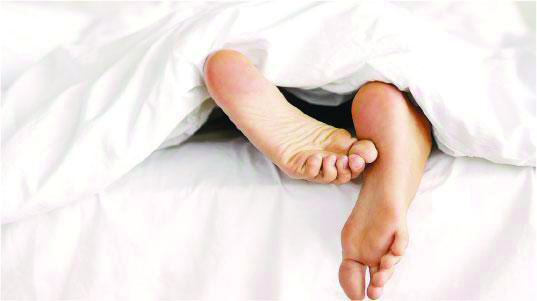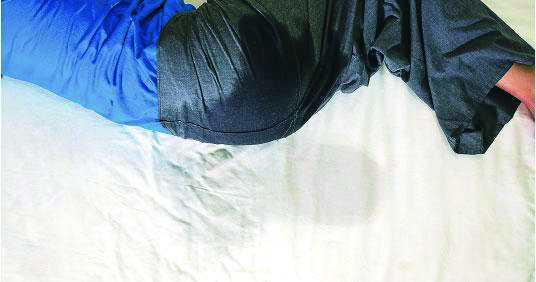[Nan Qingyi Care]Falling out of bed and wetting the bed with itchy feet?Or hidden disease warning signs beware
[ad_1]
Text: Shen Yashi “Ming Pao”
When it comes to sleep disorders, insomnia, nightmares, easy to wake up, sleep apnea, we all hear a lot; but there are also some unexpected “atypical” sleep disorders, which not only affect the quality of sleep, but may also hide health risks behind them.
(Hong Kong News) Have you ever tried falling out of bed in your sleep? Or lying down every night, there seem to be many ants crawling around on the legs, numbness and discomfort? Even “accidentally” wet the bed while sleeping?
In the following 3 cases, the victims each had strange experiences while sleeping. Is it purely accidental, psychological, or pathological? And Chen Yongxin, an associate professor of the Department of Psychiatry, Faculty of Medicine, Chinese University of Hong Kong, answered one by one.

Strange Case 1: Falling out of bed with a loud noise
Mr. Chen (pseudonym), in his 50s, has no chronic pain and can “sleep in seconds” as soon as he goes to bed every night. However, in the past two years, strange things often happened to him while sleeping—falling out of bed!
“I’ve tried 5 or 6 times. I was caught by my wife in time twice, but the other times I really fell to the ground. Fortunately, I only scratched my hands and feet every time, and there was no serious problem.” Mrs. Chen described, every time The husband seemed to be “hitting a ghost”. He slept until midnight and suddenly yelled, and then fell out of bed. Mr. Chen thought that he was “woke up” by having a nightmare, but he couldn’t remember the dream after waking up.
Teardown: or a precursor to neurodegeneration
Chen Yongxin said that through life experience, adults have established sleep safety awareness, so they will not fall out of bed because of crawling around like children. Moreover, adults have a concept of the size of the bed, and will avoid lying on the edge of the bed when sleeping; they also have high alertness, even if they have fallen asleep, but when they feel that their hands and feet are hanging outside the bed, they will immediately withdraw consciously. Therefore, compared with children, the chance of falling out of bed is smaller. However, Mr. Chen has 5 or 6 relevant experiences, so it is worthy of attention.
According to Mr. Chen’s description, every time he fell out of bed, he had nightmares, that is to say, he was in the sleep cycle of rapid eye movement (REM) sleep at that time. Theoretically, the muscles of the whole body are the most relaxed at this time. Even if there are movements such as running, jumping, and screaming in the dream, you should still behave quietly on the bed. However, in patients with rapid eye movement sleep disorder (REM sleep behavior disorder, RBD), even in the REM stage, the muscles are not completely relaxed, so some complex movements or sounds follow the dream.
She said that there was a patient who had a dream of being robbed of his bag, so he tried his best to pull it back, but he didn’t realize that he was actually pulling his wife’s hair.
RBD patients are also more likely to have some intense dreams, such as arguing or wrestling with others, being chased by ghosts or animals, etc. About 30% to 50% of patients will self-harm during sleep, such as falling out of bed, hitting walls, etc. RBD patients are mostly male, and the age of onset is about 60 years old.
“Although Mr. Chen is only in his 50s, it is still recommended that he undergo polysomnography, which includes the use of EEG to record his brain wave activity during sleep, and the use of EMG to check whether his muscle tone increases during the REM phase. , to determine whether they have RBD.”
The reason why RBD cannot be ignored is that more and more data show that RBD seems to be the early stage of neurodegenerative diseases, especially the most closely related to Parkinson’s disease. “More than half of the patients with Parkinson’s disease have RBD symptoms.” Patients should first pay attention to home safety. If they often fall out of bed, they may consider laying soft mattresses or sleeping on the floor directly. When necessary, doctors will prescribe drugs, including melatonin or sedatives, to help patients reduce nightmares and even “dancing” during sleep.

Strange Case 2: Feet are itchy like ants crawling
Mr. Liang (pseudonym) has been complained by the person next to him that he often “kicks the quilt”, which makes everyone sleep badly. “What I don’t want is that my feet are very uncomfortable, like ants crawling around, and I can’t help kicking my feet.” Mr. Liang once thought it was caused by unclean sheets or dry skin, but even after changing the sheets, double I applied a lot of moisturizer on my feet, but the discomfort still persisted. “My wife said it was psychological, but I don’t think so, but I can’t describe the numb and itchy feeling.”
Teardown: Neurological Disease Restless Legs
There is a sleep disorder that is often overlooked called restless legs syndrome (hereinafter referred to as restless legs), which is very similar to the case of the victim.
Chen Yongxin said that there was a patient whose symptoms were quite serious, but he could not describe it in detail when he saw the doctor. He only said that he felt soreness, cramps, and discomfort, and in short he couldn’t sleep. The doctor prescribed sleeping pills because he “couldn’t sleep”, but the patient’s condition did not improve after taking the medicine, so he increased the dose without authorization, and as a result, sleepwalking occurred after taking more and more. “It was later referred to our sleep examination room, only to find out that he had restless legs.”
Patients with restless legs often feel an indescribable discomfort in the lower limbs (some people will accompany the upper limbs) when they are at rest. They are restless and must move or move their feet to relieve the discomfort. “What’s more special is that this disease has a circadian rhythm, and the symptoms are usually especially obvious at dusk, evening, and before going to bed.”
Restless legs are not psychological, it may be a neurological disease, believed to be related to the lack of neurotransmitter dopamine. Although so far, there is no direct scientific data to prove that this disease will increase the risk of dementia; but it is known that some diseases such as anemia, iron deficiency, thyroid disease, diabetes, renal failure, etc. Causes restless legs, so further investigation may be needed to find the cause.
“Doctors will formulate different treatment plans according to the patient’s condition. For example, iron deficiency anemia can eliminate symptoms by supplementing iron; in addition, dopamine stimulants, sedatives, and anti-epileptic drugs can also relieve symptoms. Discomfort in Ning Leg patients.”

Strange case 3: bedwetting after socializing
Sleeping is the most relaxing time, but Mr. Liang (pseudonym) is always flustered because he doesn’t know when he will “wet the bed” again. “This happened intermittently. When I was in the worst state the year before last, I tried twice in a month, and I ‘missed’ once in 3 or 4 months on average. The situation was better last year, and I only wet once in the whole year. This year is the happiest. , so far all is well.”
After thinking about it, Mr. Liang realized that every time he went to bed, he would be in bed after socializing, or his body was extremely overdrawn during that period. For this reason, he had given up beer and rested as much as possible.
Teardown: BPH or UTI
The diagnostic criteria for secondary nocturnal enuresis in adults refers to the normal control of nocturnal urination, but sudden involuntary bedwetting more than 2 times a week, and the occurrence lasts for more than 3 months. Although the frequency of bedwetting in Mr. Liang’s case did not meet the diagnostic requirements, why did he wet the bed? Also worth exploring.
The bladder capacity of adults is larger than that of infants, and can normally store 300 to 400 ml of urine. With mature functions, the body secretes antidiuretic hormone during sleep, which helps the kidneys to concentrate urine and reduce urine output. However, the following situations may have an impact:
Drinking a lot of water or diuretic drinks before going to bed, or people with diabetes who need to take diuretic drugs will cause a lot of urine to be produced at night.
If the bladder is sensitive or overactive, the chance of enuresis increases. This situation often occurs in patients with urethritis, or those who suffer from constipation for a long time.
Normal adults will wake up to go to the toilet when they are in urgent need of urination, but some people are affected by alcohol or sedative drugs, and it is difficult to wake up; patients with sleep apnea are more likely to be in a half-dream state, and have a higher chance of enuresis.
Older men are more likely to have benign prostatic hyperplasia. Because the urethra is squeezed, it will affect urination and are more prone to enuresis.
If other diseases are ruled out, it is recommended to adjust water intake before going to bed, reduce drinking alcohol and caffeinated beverages, and maintain good living habits and weight, all of which will help improve the situation.
[ad_2]
Source link

![[Love Wants Sexual Happiness Series 358]Find the culprit and overcome psychogenic erectile dysfunction. Don’t let pressure affect your sexual happiness.](https://chinathenews.com/wp-content/uploads/2024/04/171111-780x420.jpg)

![[Wanqingyi Care]My health, my rights, customized medical methods in the last stage of life](https://chinathenews.com/wp-content/uploads/2024/04/ZZ1-100-780x420.jpg)
![[Kidney Transplantation Special Topic]The survival rate of transplanted kidneys is high without dialysis treatment three times a week](https://chinathenews.com/wp-content/uploads/2024/04/1311-780x420.jpg)



